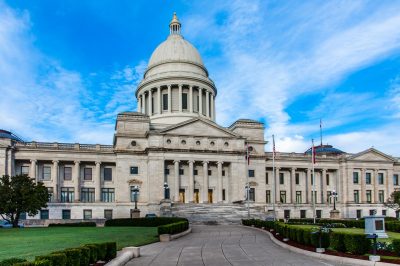 A group of anti-gambling lobbyists insists that the Arkansas State Racing Commission should be prohibited from granting a license for the planned casino in Pope County. According to the casino opponents, the local regulatory authority did not handle the assessment of the prospective licensees’ applications adequately enough, failing to conform to its own rules.
A group of anti-gambling lobbyists insists that the Arkansas State Racing Commission should be prohibited from granting a license for the planned casino in Pope County. According to the casino opponents, the local regulatory authority did not handle the assessment of the prospective licensees’ applications adequately enough, failing to conform to its own rules.
The group in question is called Citizens for a Better Pope County and is represented in court by the attorney Jerry L. Malone. Mr. Malone filed a request to void the first license application window in the Circuit Court of Pulaski County.
The casino controversy in Pope County was seemingly drawing toward its end since the license competition was down to two applicants, as Casino Games Pro reported earlier this month. This is hardly the first time the Citizens take the matter to court in their attempt to deter the new casino.
Not the First Time the Group Tries to Hinder the Casino Plans
 The group initially tried to pave the way for an unconstitutional referendum on the Pope County gaming venue but failed to win this battle. However, the casino opponents achieved a small victory on a separate occasion when Circuit Judge Wendell Griffen temporarily restrained the second round of license applications.
The group initially tried to pave the way for an unconstitutional referendum on the Pope County gaming venue but failed to win this battle. However, the casino opponents achieved a small victory on a separate occasion when Circuit Judge Wendell Griffen temporarily restrained the second round of license applications.
In effect, the Judge’s decision prevented the Arkansas Racing Commission from granting a permit based on the applications it had received during the second round of the licensing process. Judge Griffen considered the regulatory body went against its own rules when it opened the now-abandoned second window.
The Racing Commission eventually decided to ditch the second window altogether and accept the applications of two prospective licensees earlier this month, Cherokee Nation Businesses from Oklahoma and Gulfside Casino Partnership from Mississippi.
Amendment 100 was approved by state voters in November 2018, paving the way for fresh casino projects in the counties of Jefferson and Pope. It also allowed for a further gambling expansion at the Hot Springs and West Memphis racecourses.
Applicants Need Endorsement from Local Officials in Office
 Five candidates initially joined the licensing race for the permit in Pope County but all of them ended up being rejected. The reason was that none of the five contenders had received the endorsement of local officials who were in office when the applications were submitted, a new rule created by the Racing Commission.
Five candidates initially joined the licensing race for the permit in Pope County but all of them ended up being rejected. The reason was that none of the five contenders had received the endorsement of local officials who were in office when the applications were submitted, a new rule created by the Racing Commission.
Act 371 dictated the same thing, leading to the rejection of all five candidates. Four of them lacked any endorsement whatsoever. The only applicant backed by local officials was Gulfside Casino Partnership. However, its application was ditched because its letter of recommendation was granted by officials who had left office in the winter of 2018.
Then the application of Gulfside was sent back to the regulator for reconsideration by Circuit Judge Timothy Davis Fox from Pulaski County. The Pulaski Circuit Judge determined the new rule of the regulator was unconstitutional, causing Gulfside to re-enter the licensing race.
Meanwhile, the Cherokee Nation Businesses received backing from Judge Ben Cross from Pope County, also re-entering the competition. The applications of the two contenders will be assessed by a third-party contractor who will then recommend one of them to the Arkansas Racing Commission.
However, the anti-casino lobbyists argue in their new court filing that the regulatory body has not amended its own rules in line with the state’s Administrative Procedure Act. They insisted this was done intentionally as a means of bypassing one important rule that called for assigning merit points to the applicants and unveiling them publicly at the start of the application window.
The Criteria for Assigning Merit-Point Values
 As for the criteria for assigning the merit points, these include the following under the Commission’s Rule 2.13.9.b – previous experience in conducting gaming operations, proof of the applicants’ financial stability along with access to their fund resources, in-depth summaries of the proposed casino projects, and specific timelines for the gaming venue’s launch.
As for the criteria for assigning the merit points, these include the following under the Commission’s Rule 2.13.9.b – previous experience in conducting gaming operations, proof of the applicants’ financial stability along with access to their fund resources, in-depth summaries of the proposed casino projects, and specific timelines for the gaming venue’s launch.
Under the same rule, a review panel should be formed, consisting of members of the Commission for the purpose of assessing the license applications and awarding points to the applicants based on the above-listed criteria. The applications are then ranked in descending order based on the applicants’ overall point score.
The Citizens’ attorney, Jerry L. Malone, argues the Racing Commission failed to meet these requirements, deeming the accepted applications as non-compliant and unlawful. Mr. Malone is also of the opinion the regulator has acted outside its authority.
The two contenders, the Cherokee Nation Businesses and Gulfside Casino Partnership, refused to discuss the latest legal actions the casino opponents have taken. Scott Hardin, the spokesperson for the Arkansas Racing Commission, insisted the issue is to be discussed in depth during the regulatory authority’s upcoming meeting, which is likely to take place next week.
Meanwhile, the construction of the casino of the approved Jefferson County candidate, the Quapaw Nation, has already commenced. The Saracen Casino Resort is being built in Pine Bluff. John Berry, who chairs the Quapaw Tribe, commented the situation was rather different in Jefferson County since the Quapaws were the only applicant for a casino license there.